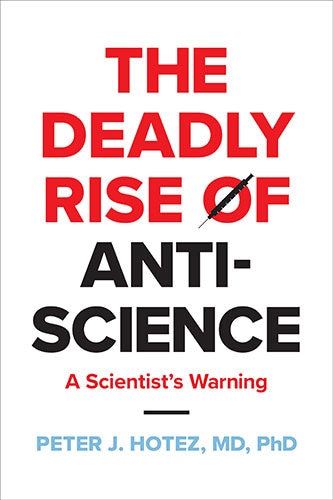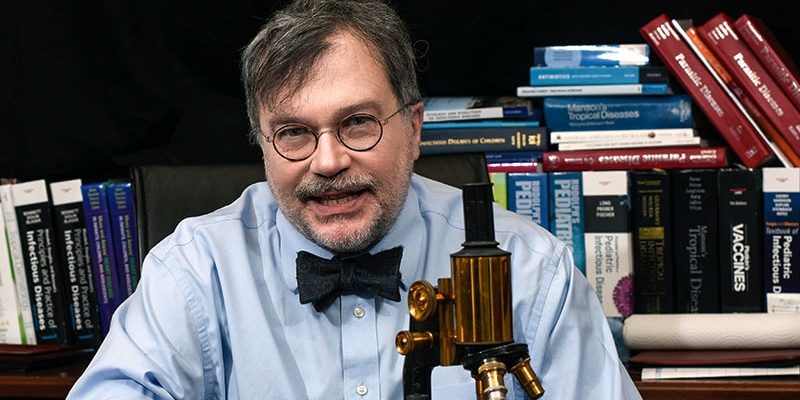During the most challenging days of the COVID-19 pandemic, scientist Peter J. Hotez, MD, PhD, became a household name, thanks to his daily appearances on cable news stations, NPR, and the BBC.
During that time, the professor of pediatrics and molecular virology and microbiology, and the founding dean of the National School of Tropical Medicine at Baylor College of Medicine, Houston, Texas, was nominated for a Nobel Prize, developed a nonprofit COVID-19 vaccine, and worked tirelessly to keep the public informed.
What also happened: Hotez, who is also the co-director of the Texas Children’s Hospital Center for Vaccine Development, became a top target for the anti-vaccine community and of anti-science rhetoric, culminating in podcast host Joe Rogan challenging him this summer to debate presidential candidate (and vaccine skeptic) Robert F. Kennedy Jr. on his podcast. (Hotez declined.)

In his new book, The Deadly Rise of Anti-Science: A Scientist’s Warning, Hotez sketches how the anti-vaccine movement has dovetailed with far-right political propaganda and what we can do to combat science denial.
Medscape: Let’s talk about Joe Rogan challenging you to debate RFK Jr.
Hotez: Now that I’ve had more time to think about it — to understand it and to put it in context — the big pieces are this: Now that Anthony Fauci is out of public life, it’s harder for them to target him. Part of what Fox News and far-right extremists do is that they create a faux outrage machine.
They need a lead scientist to be at the top and I’m clearly one of the candidates. With respect to RFK Jr., you might wonder why [right wing operators] Steve Bannon and Roger Stone are promoting him. It’s because the best hope for a Trump win is for a strong third-party candidate to take votes away from [President Joe] Biden. That’s why they’re propping him up and debating me is a way to legitimize him as a serious person. My refusal, despite offers of hundreds of thousands of dollars donated to a charity of my choice, diminishes his stature and they’re mad. I popped their bubble.
Medscape: Your book is very upsetting to read.
Hotez: The book tells a dark chapter in American history. During the pandemic, people were expendable. Human life was cheap and used for political gain. Part of the point of the book is to wake people up. Too often we toss this off as misinformation, as though it’s random junk, but this is organized, it’s deliberate, and it’s politically motivated.
Medscape: What’s a way to easily understand America’s history of anti-science?
Hotez: There have been anti-vaccine, anti-intellectual movements throughout the history of the United States going back to colonial times. The game changer is that never before has it been fully adopted as a platform of a major political party targeting science and scientists and portraying us as enemies of the state.
Pair this with the fact that being able to spread that disinformation so effectively through Fox News, social media channels, and extremist podcasters and that’s the game changer. In the process, this movement has become as lethal a societal force as suicides and gun violence in terms of the numbers of deaths, but we don’t pitch it that way.
Medscape: What can be done about this?
Hotez: Part of the problem is that the scientific community is a bit baffled by it all. It’s taken me a while to absorb it. To be portrayed as an enemy of the state is shocking and the leaders of the healthcare sector are fumbling.
For example, I think our surgeon general is great, but what does he do? He talks about issuing an advisory to social media companies. Yes, we want to do that, but that doesn’t get to the core of the matter, it doesn’t get to those generating this content and causing so much damage and harm.
By the way, this not only harms in terms of lives lost, but it harms our standing in the world. I like to point out that we’re a nation built on science, technology, and the strength of our research institutions. That’s being undermined.
Medscape: What would it take to create more guardrails to protect scientists?
Hotez: I think we need more public expressions of support from the scientific societies and from the White House.
Scientists are amongst our nation’s most valuable treasures, but the support isn’t forthcoming. I believe we need to look at creating organizations that are similar to what climate scientists have done, since the attacks on biomedical scientists aren’t so different from the attacks on climate scientists.
That’s why I’m in discussions with colleagues about creating something along the lines of the Climate Science Legal Defense Fund.
Medscape: You write that we’re in a complicated and multifaceted war against science and that it’s one without an obvious end. How scared should we be?
Hotez: We should be worried — I don’t know about scared. As Marie Curie said, ‘Nothing in life is to be feared, it is only to be understood.’
What concerns me is that future pandemics are coming and COVID numbers are going back up. I worry that young people won’t want to become scientists. If this work isn’t portrayed as something heroic and meaningful and, instead, we’re considered a public enemy, it’s lights out for American science.
Medscape: How will vaccine hesitancy ultimately affect childhood vaccination programs?
Hotez: Our vaccine ecosystem has always been fragile. It doesn’t take much for a good vaccine to be voted off the island due to public perception and the U.S. style of anti-vax activism is spilling over globally.
Medscape: Should scientists stop being politically neutral?
Hotez: We’re trained to be politically neutral at all costs, but what if the attacks are partisan? Scientists need the license to discuss it. I haven’t found a way to talk about this other than to talk about it, so I talk about it.
Medscape: Ultimately, what’s one thing you want readers to take away from your book?
Hotez: While there have been anti-science sentiments simmering throughout the history of the United States, this is now organized, institutionalized, and entrenched in American political life like never before — and it has the capacity to destroy our democracy.
For more news, follow Medscape on Facebook, X (formerly known as Twitter), Instagram, and YouTube.
Source: Read Full Article
